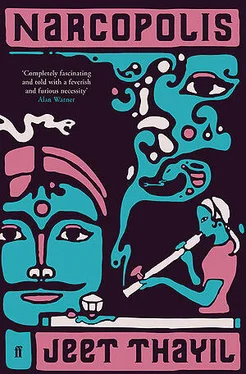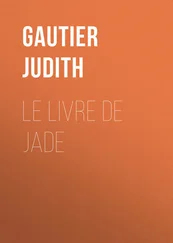Jeet Thayil - Narcopolis
Здесь есть возможность читать онлайн «Jeet Thayil - Narcopolis» весь текст электронной книги совершенно бесплатно (целиком полную версию без сокращений). В некоторых случаях можно слушать аудио, скачать через торрент в формате fb2 и присутствует краткое содержание. Год выпуска: 2012, Издательство: Faber & Faber, Жанр: Современная проза, на итальянском языке. Описание произведения, (предисловие) а так же отзывы посетителей доступны на портале библиотеки ЛибКат.
- Название:Narcopolis
- Автор:
- Издательство:Faber & Faber
- Жанр:
- Год:2012
- ISBN:нет данных
- Рейтинг книги:3 / 5. Голосов: 1
-
Избранное:Добавить в избранное
- Отзывы:
-
Ваша оценка:
- 60
- 1
- 2
- 3
- 4
- 5
Narcopolis: краткое содержание, описание и аннотация
Предлагаем к чтению аннотацию, описание, краткое содержание или предисловие (зависит от того, что написал сам автор книги «Narcopolis»). Если вы не нашли необходимую информацию о книге — напишите в комментариях, мы постараемся отыскать её.
Outside, stray dogs lope in packs. Street vendors hustle. Hookers call for custom through the bars of their cages as their pimps slouch in doorways in the half-light. There is an underworld whisper of a new terror: the Pathar Maar, the stone killer, whose victims are the nameless, invisible poor. There are too many of them to count in this broken city.
Narcopolis
Narcopolis — читать онлайн бесплатно полную книгу (весь текст) целиком
Ниже представлен текст книги, разбитый по страницам. Система сохранения места последней прочитанной страницы, позволяет с удобством читать онлайн бесплатно книгу «Narcopolis», без необходимости каждый раз заново искать на чём Вы остановились. Поставьте закладку, и сможете в любой момент перейти на страницу, на которой закончили чтение.
Интервал:
Закладка:
Chapter Four The Sari and the Burkha
She moved into the room halfway up the landing from Rashid’s khana. She never went to the floor above, where his family lived. But from time to time she met them on the staircase or on the street and she understood that Rashid’s eldest, Jamal, was her enemy. Rashid’s wives were friendlier, even if they didn’t speak. Only Rashid seemed unaffected. To mark her new situation, he gave her a new name, Zeenat, and he brought her a burkha. He sat in the only chair, sipping his morning whisky and peering at her through the smoke from his cigarette. No good, he said. See how lumpy it is? Take off the kameez and leave the salvaar. She took off the printed top and slipped back into the burkha. He watched her, his arm propped on the back of the chair. Then he nodded and took her to the mirror. She saw how the shiny black fabric clung to her. How revealing it is, she thought, and looked at herself and whispered, Zeenat. After a while Rashid asked her to take off the salvaar too and now the burkha was silk against her skin. He liked it so much he wanted to take her for a ride in a taxi, to sit in the back and watch the sights, and only they would know she was naked under the burkha. No, she said, no, never. But she was enjoying herself.
*
She didn’t stop wearing saris, which covered the legs and exposed the belly, exposed the intimate part that should be seen only by a lover or husband. She’d learned how to wear the petticoat low on the hips, how to lean forward accidentally on purpose and let the pallu slip just a little. She admired the uses to which women put the sari, how they wore it without underwear, slept in it, bathed in it, used it as a towel and comforter, and the convenience, to simply lift it up if you wanted to pee or if there was a customer. But she looked at herself in the burkha and understood that this was something very different. The tools were fewer. Only the face was visible, only the feet and hands, and because everything else was covered, a glimpse of eye or mouth became tremendous and powerful. And the blackness of it, the gradation, the way the fall of the fabric was different on her breasts and hips. She wondered at the men who designed such a garment. How much they must have feared their own desire. To want a woman to wear this thing you had to know the danger that lay in looking. You knew it and you knew your powerlessness and you dreamed up a costume to conceal the cause of your shame. But the costume only served to punish you further. It made you want to pluck out your eye, pluck it out and hold it, pulsing and sinewy in your hand, and offer it as some inadequate token.
She went out in the burkha and she saw the way the men looked at the lipstick on her mouth and the kaajal around her eyes. The men looked at her, Hindus, Muslims, Christians, they all looked. She stopped outside Grant Road Bazaar where the handbags were stacked in piles on the sidewalk. The vendor was a young guy in bell-bottoms, whose eyes lingered on her feet. She bought a clutch purse and paid him in small notes, grubby one- and two- and five-rupee notes that she dug out of her bra. The vendor took the notes with a smile, making sure their fingers touched. She walked on and now the vendors all seemed to be speaking at once, speaking only to her, offering special deals — Hello, madam, low price for you — not because they wanted her to buy something but because they wanted her to stop so they could get a look at her.
*
She didn’t give up saris. She varied her costume depending on who she wanted to be, Dimple or Zeenat, Hindu or Muslim. Each name had its own set of adornments. Then Bengali told her about a shop in Tardeo that sold saris from the entire subcontinent. She went there one afternoon in the mango season to buy the Begum Bahar. It was fine see-through gauze. Bengali told her that women painted their buttocks and their feet when they wore the Begum Bahar, so she tried it too, painted herself with red shellac dye and then took a look in the mirror. She wore no skirt under the sari and the effect was subtle. You could see the shape of the ass and thighs, but the work on the sheer fabric obscured her figure just enough. She knew some of her giraks would pay a lot to see her in the Begum Bahar. Bengali said, Now you look like a lady of the merchant class, an indolent Bania woman with many admirers. No, she said, looking at the semi-circles under her eyes, so dark they were like bruises. No, I’m like a woman whose only admirer hanged himself so long ago that she can’t remember his name or why he killed himself or whether she misses him; all she’s sure of is her own solitude and regret and, above all, her anger. Bengali said, You’re wrong, your admirers are numerous and I’m proud to count myself among them. And he left the room so quickly that she knew he’d embarrassed himself. She changed out of the sari and put on a salvaar. She never wore burkhas while working; Rashid said it was out of the question. His customers were pimps and chandulis, yes, but they were conservative about some things and they would not take kindly to a woman in a burkha making the pipe. In any case, said Rashid, salvaars were more convenient. She changed and took up her spot at the main pipe and after she made Rashid’s first pyalis of the day she served those who waited, Rumi usually among them. He came to talk as much as to smoke. He lent her his headphones and played music she had never heard, in particular, jazz, for which he had developed not a liking exactly but a taste, he said, like a taste for anchovies or bitter chocolate, an unexpected appreciation that comes upon a man late in his life. He told her about his work or his domestic situation, and he talked about his life, which, it seemed to her, was nothing if not a disaster.
*
The night before, he said, he’d come home from work at the usual time, around ten, because the commute by train and bus took an hour and a half. He walked in the door and the television was blaring in the bedroom. His wife wouldn’t get up and say hello. She was always tired, so tired she woke up exhausted, which wasn’t surprising, since she spent most of her time watching Doordarshan. He was the one who worked all day and she was tired, Rumi told Dimple, his voice thick with smoke and anguish. He put his briefcase down, he said, and he went into the bathroom to wash the grime off his hands and face. Then he pulled on a pair of jeans and a Pink Floyd T-shirt and immediately he felt a little less like an office clerk. In the kitchen he looked at the mess of plates in the sink and checked for roaches. None so far but they’d be out in force when the lights went out. His dinner was on the stove, still warm. She’d already eaten, his wife, whose main pleasure in life was food. She’d eat lunch, really pig out, and right away be talking about dinner. Like there was nothing else worth staying awake for. No, what was he saying? Of course there was: television. Food and television, in that order but preferably together. He heated yellow daal and a dish of dry green peppers and put the bowls on a plate and took some rotlis and carried the food into the bedroom where he sat on a chair in front of the television with the plate balanced on his knees. His wife wore the same nightie she’d been wearing when he left that morning. She was on the phone to her aunt in Delhi. Right through his meal she talked in Gujarati and stared at the television. The conversation was an ever-expanding menu of rotlis and rotlas, bakhris, theplas, undhyu and chaas. Every topic eventually came back to food. By now, he understood enough of the language to get a sense of the conversation. His wife was telling her aunt how much she missed the mango ras her aunt used to make and there was a shine in her eyes when she said the word ‘ras’. She might have been talking about sex or god. After a while she covered the receiver with her hand and whispered that there was ice cream in the fridge. His wife was a Jain: there were many foods her family didn’t eat, a tremendous array of perfectly harmless items. Ice cream was out of the question because it was made with eggs. If her parents were visiting, she scoured the kitchen to find and hide potatoes, garlic and onions. As far as her family was concerned non-Jains were polluted, contaminated, damned, and there was only a difference of degree between such a person and an Untouchable. He and his wife had met as students at Elphinstone College and when they decided to get married, on his return to Bombay after a year in the States, there had been tears and threats from her parents, their opposition based on the single unalterable fact that he was not of their community. There was no point telling them he was a Brahmin, no point mentioning that he was descended from the Rishis, which he was, he was pure Aryan, one of the elect. What more could a wife want? he asked Dimple. After dinner, he put his dishes in the sink and said he was going out for a walk. And he got out of there before he got into a slanging match with his wife, told her to bathe once in a while and change her clothes and act like a human being. But then she’d get into it too, tell him she’d act more like a wife if he acted more like a husband and took her out sometimes, if he brought money home instead of spending hers. In the car, to clear his head, he punched in Band of Gypsies and turned the volume up and drove badly, which fact he admitted with pride, it seemed to Dimple, because he grinned and pretended to change gears. He opened a window when he saw the sea and made the turn at Otter’s Club and took the Carter Road promenade where the model citizens had their evening constitutional. He parked at an angle so no cop would spot him and emptied two pudis into a cigarette. Then he took a moment to digress, telling Dimple that he knew the one thousand and one names of god and he knew the one thousand and one names of heroin and if sometimes he mixed them up, at an arti, say, if for example he said Satyam, Sharam, Sundaram — Truth is Heroin is Beauty — he knew it was allowed, because no one was listening anyway, not to him. What he wanted to know was this, who put the words in his head? How did they arrive, these sentences, so fully formed they seemed to be uttered by a divine voice? Why did he say, as he did one evening at a Mahim NA meeting, the room brightly lit, a red neon cross glowing over the decayed beachfront: Our Father who art in Scag, hallowed be thy Scag, thy Scag is clean, thy Scag is good, thy Scag will be done now and at the hour of our deaths. Ah men. Ah women too. And to say it so solemnly that nobody took offence, not even the Catlicks, because he folded his hands and let a pious smarmy lilt enter his voice. And of course: he’d smoked before the meeting. And of course: it was the heroin that filled him with warmth and fellow feeling for the collection of self-serving egomaniacs that made up the ranks of the narcotically fucking anonymous. And finally, of course: It was the heroin, said Rumi, looking unblinkingly into Dimple’s eyes, looking at her so steadily that she had to look back. She noted the unusual length of his lashes, like a girl’s, though she could not say what colour his eyes were because smoke was seeping from his ears and collecting in pools around his skin. It was heavy smoke that fell from his pores to the floor of the room and filled the corners and pushed inwards. When the smoke level touched her mouth with the taste of sewage, she got up and went to the door and rushed blindly downstairs, but it was thicker there, so she reversed her flight, went up past her own door, past Rashid’s and up to the roof, from where she saw that the street and the city and possibly the world in its unimaginable entirety was submerged, and though she shouted to the dim shapes discernible below, shouted until she was hoarse, no one was able to hear her, because the smoke was in her own mouth now, in her own nostrils, filling her with its white living vapour.
Читать дальшеИнтервал:
Закладка:
Похожие книги на «Narcopolis»
Представляем Вашему вниманию похожие книги на «Narcopolis» списком для выбора. Мы отобрали схожую по названию и смыслу литературу в надежде предоставить читателям больше вариантов отыскать новые, интересные, ещё непрочитанные произведения.
Обсуждение, отзывы о книге «Narcopolis» и просто собственные мнения читателей. Оставьте ваши комментарии, напишите, что Вы думаете о произведении, его смысле или главных героях. Укажите что конкретно понравилось, а что нет, и почему Вы так считаете.












